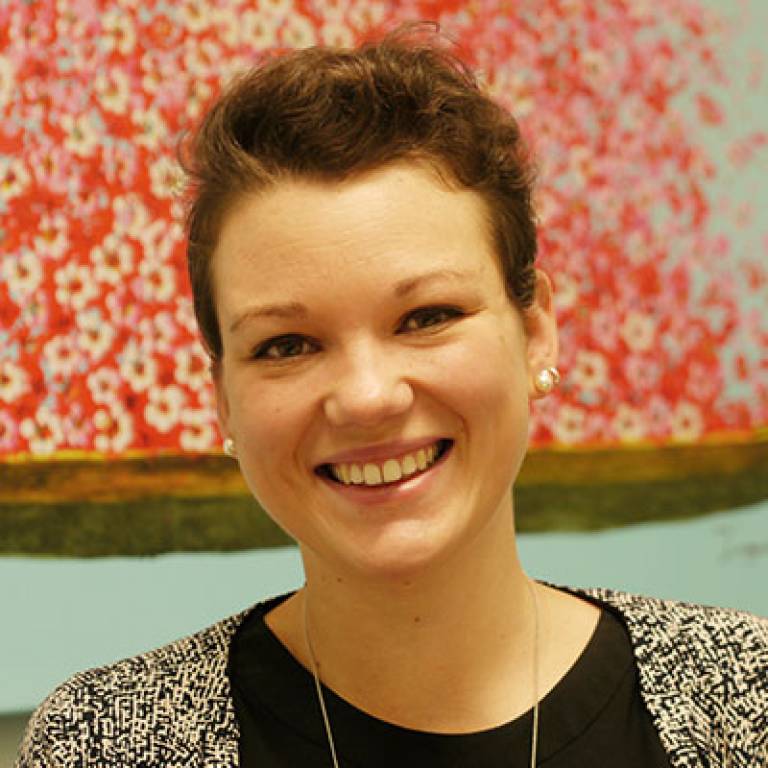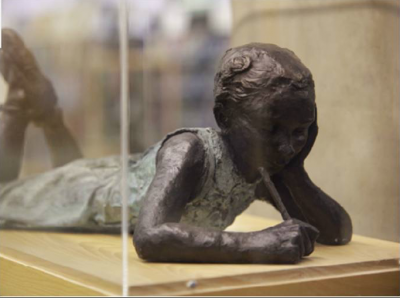Seven questions with Francesca Peruzzo
30 April 2018
This week we speak to Francesca Peruzzo, an Italian student in the UCL Institute of Education (IOE) who is completing her PhD on disability in higher education and ran a UCL ChangeMakers project in relation to it.

1. Why you are interested in this subject and what do you plan to do in the future?
My PhD is about disability in higher education. I used to be a disabled-student assistant back in Italy during my undergraduate and my masters degrees. I decided to come to UCL because I became interested in a specific model of disability called Social Model of Disability that is still not very well known in Italy. Additionally, most of the material about this model is in English and my English wasn't that good, so I decided to come to London to improve my English and to get access to this material. I then decided to stay here to do my PhD. My project is about processes of exclusion of disabled students in higher education; I'm looking at policies and practices in the Italian higher education setting. The plan in the near future is to successfully hold a conference on disability as an interdisciplinary subject here at UCL. I won some funding with the UCL Grand Challenges for Justice and Equality and on Wednesday 9 May I will be organising with a colleague, Rafie Cecilia, the first UCL Interdisciplinary Conference on Disability at the Bartlett School of Architecture! We received contributions from almost all the centres researching disability here at UCL. It is going to be a great moment for disability and academia! Afterwards, when my PhD is completed, I'd like to become a researcher in disability studies.
2. What is the most interesting thing you've done, seen or got involved with while at UCL?
When I arrived at UCL, I noticed that I rarely met any disabled students. I knew they have to be here, so I wanted to create a space to hear their voices, but not just them: to open a space to debate disability in academia, what is going well and what still needs to be improved.
When I received an email from my department about UCL ChangeMakers, I decided to propose a project and got the funding to organise an event called 'Disability in Academia: Voices from Disabled Students'.
It consisted of a panel of six UCL disabled students sharing their experiences of being disabled at UCL in a form of short TEDtalks. With the support of the Disabled Student Officer at that time, Kyle Jordan, we collected narratives, I helped students to craft their speeches and then we organised an event in the Arena Room, where best practices were shared, but also where improvement is needed.
Afterwards, I analysed the speeches and had the opportunity to present it, with Kyle, as a keynote speaker at the Teaching and Learning Conference last year (now the UCL Education Conference). This presentation also became a report that we shared in a disability service monthly meeting!
What is challenging is having still to hear how simple practices, such as a bigger PPT font are still crucial problems to students, that they still struggle to have the right access to a university and its facilities. University should be a choice, not something that we need to do, but if we choose to go to university, it has to be 100% accessible and not discriminating.
The project was really demanding, but also one of the most exciting moments of my PhD, besides, obviously, writing my research. I really felt supported by the UCL ChangeMakers team and I am collaborating with them on other projects such as writing the Student Guide to Assessment and Feedback which will be out later this year. They really know how to enhance your abilities and to give you the strength and the opportunity to pursue your projects.
It is an invaluable opportunity we have: we can improve and enhance the university with our small but big ideas, from the bottom to the top.
3. Have you discovered any 'hidden gems' during your time at UCL?

There is a specific sculpture at the IOE library that I love. It's called Cassandra, by Rosemary Cook. It's a little girl lying down on her belly in the act of writing and thinking about what she is writing - it's mesmerising. It makes me think how learning can be such an enjoyable process and how you can lose yourself by doing that. We tend to forget that.
4. Give us your top three things to do/see/go to in London
1. I love the canal. I've walked along almost all the canals in London, but the bit from Angel to Victoria Park is my favourite. London is a great place to walk and the canal is amazing.
2. Brixton market. I live in Brixton and I really like my neighbourhood. It's very diverse, so you have a variety of different cuisines. And I really, really like it.
3. The Tate Modern - there is in the permanent collection section by the Guerrilla Girls which is a radical feminist movement. It's an US organisation and they campaign for more women in art. I think it's very important to ask questions about feminism and how we should bring it to academia as well.
5. If you were Provost for the day, what one thing would you do?
I think, despite loving being part of the academia, I can see that academia is becoming increasingly a business for knowledge. So what I would do for one day is to bring knowledge back to students. It is a student-led university and I know that we do have space to have our voices heard. I just want to scrap the business culture for one day. I know that it sounds naive, but it'd be nice to have a change in the university. Just a day of talking and thinking about where we are and what we are becoming and using our academic knowledge to inform that.
6. Who inspires you and why?
It might sound a bit of a cliché, but my grandmother is such an inspiring person: like she is almost above time. And she can understand everything that is happening now, even in my life! I don't even live in Italy anymore; I live here and yet we're still so connected. She is so empathetic with me and she is living proof that you don't need certifications to have these specific kind of abilities, you can have something that goes beyond that.
7. What would it surprise people to know about you?
I am such a talkative person that I don't really have any secrets. I'm very transparent. But I do love following any kind of sport. I don't practice any sport (and this is something that my friends know already) but I'm very into knowing about any kind of sport: regulations, results, everything!
More information
UCL ChangeMakers: https://www.ucl.ac.uk/changemakers/
Project proposals summer deadline: 15 June 2018
 Close
Close

